Kirk Hammett, Adam Jones, St. Vincent, Mateus Asato, John 5 and Christone "Kingfish" Ingram discuss the state of guitar in 2021
The all-star Guitar World roundtable is a conversation you don't want to miss...
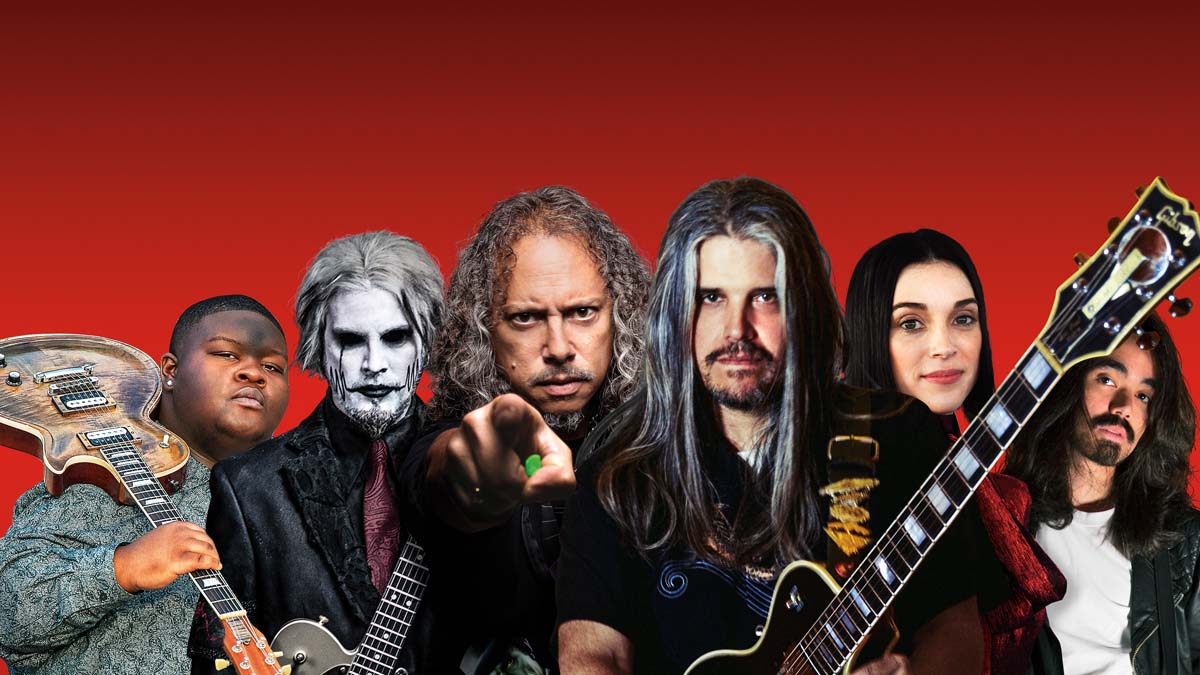
There's an old saying: the only constant is change. And to be sure, the guitar-playing universe has been in a steady state of flux since man first stretched a string between two points and gave it a pluck centuries ago.
In more modern, rock-centric times, the guitar, and how it is picked and strummed and tapped and rapped, has continued to evolve in terms of style, speed, technique and countless other aspects.
Indeed, here at Guitar World we spent much of 2020 looking back at the myriad developments that have occurred in the six- (and seven-, eight- and so on) string universe in the 40 years since this magazine debuted.
With that in mind, Guitar World rounded up six of today’s most accomplished players – all of them groundbreaking, forward-thinking artists in their own right – to discuss the state of the instrument in the present day, and also what it might look like in the future.
These artists hail from various backgrounds and play in a multitude of styles: from the otherworldly, effect-pedal-heavy electro-pop-funk-rock of St. Vincent (aka Annie Clark) to the art-damaged, shape-shifting metal of Tool’s Adam Jones; the iconic thrash riffing and heroic soloing of Metallica’s Kirk Hammett to the trad-modern downhome blues of Christone “Kingfish” Ingram; and the over-the-top shred insanity of ghoulish Tele-master John 5 to the fluid, melodically and harmonically complex virtuosity of Instagram and YouTube superstar Mateus Asato.
[Editor's note: this interview was conducted prior to Asato's departure from Instagram.]
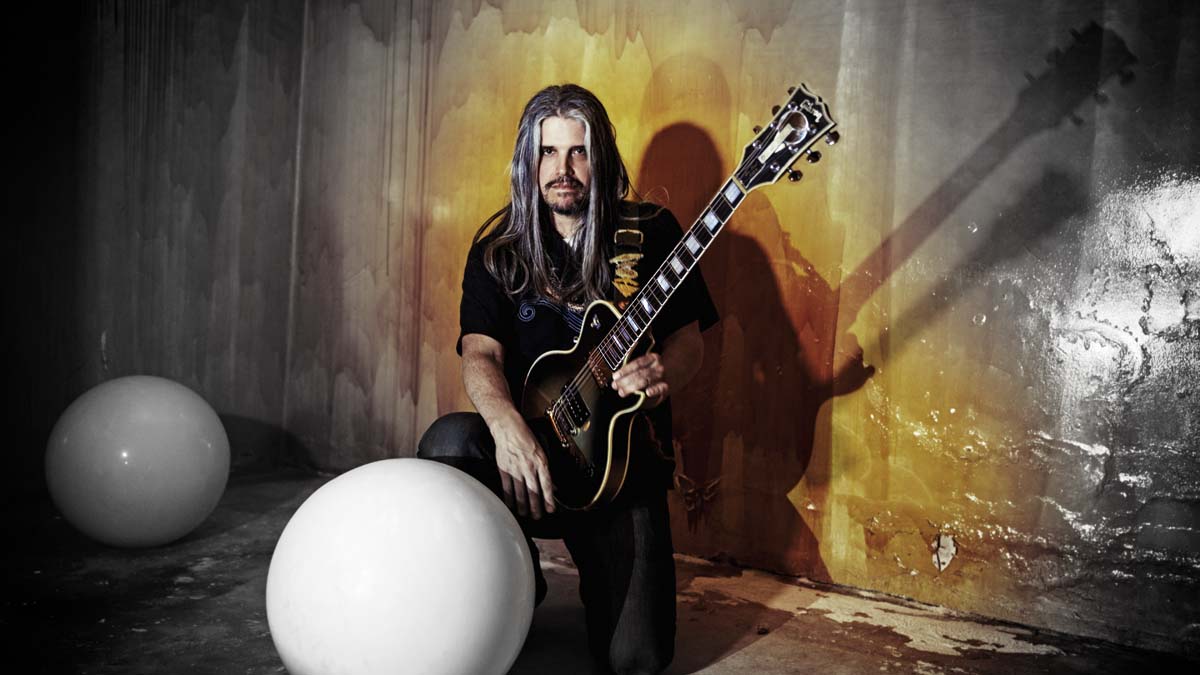
Around seven or eight years ago, there were multiple news reports about “the death of the guitar.” Whatever it was that inspired those stories – maybe it was the lack of guitar on Top 40 pop songs at the time – would you say we’ve moved on from that?
Get The Pick Newsletter
All the latest guitar news, interviews, lessons, reviews, deals and more, direct to your inbox!
ST. VINCENT: “I feel like it’s all cyclical, so we shouldn’t be writing any obituaries. And the whole mechanism is so decentralized now that there’s space for everything. It doesn’t seem like the same gatekeepers are there.
“We have streaming platforms, we have social media, we have YouTube, we have all these ways that people can discover and find new music. And so I think that it’s never going to be the death of the guitar.
“Especially after we come out of this pandemic – people are going to be eager for new sounds, new things that are creative and that feel inspired to them. And if they haven’t heard a lot of guitar, they might hear a guitar and go, “Holy shit! What’s that?'“
ADAM JONES: “I’m not familiar with the 'death of the guitar' conversation. But I’m also not on the pulse of everything going on. My style is more about being socially withdrawn and being kind of stuck in my ways.
“But I understand it. I mean, Pro Tools and digital music and just how anyone can do it in their basement now, I can see music changing and becoming less about the performance of the recording and more just an emotional statement. So I can understand why someone would say that.“
I can see music changing and becoming less about the performance of the recording and more just an emotional statement
Adam Jones
KIRK HAMMETT: “I’m not a musical snob, and I don’t want to talk shit about other genres of music, but I will say that guitar has taken a huge backseat and it’s really not as popular as it used to be. And that’s fine. I’ve been in this place before – in the early '80s it was all synths and New Wave and whatnot, but then guitar came roaring back with a vengeance.“
That’s true; when Metallica first came out, a lot of rock music was seen as dinosaur music.
HAMMETT: “Exactly. So I’m hoping it’ll roar back. Because nowadays it’s easier to learn how to play guitar than ever before. The resources are right at your fingertips. It’s a phone away, you know?“
There’s no doubt that the digital world has altered how we approach the instrument.
JOHN 5: “With the internet, with Instagram, YouTube, you have unbelievable extremes happening. People playing with both hands, Stanley Jordan-style, or doing something at great speeds or playing beautiful classical guitar – anything at all – but it’s the most extreme that I’ve seen guitar playing.
“And I love it. And I think that now it’s at a higher plateau. It’s more and more and more because younger people and older people are looking at these videos and going, “Wow!” That’s inspiring them to pick up the guitar again, or to maybe pick up the guitar for the first time.“
CHRISTONE “KINGFISH” INGRAM: “And the players, if you just go on Instagram there are so many guitar players who are finding new and different ways to approach the instrument.
“When you see all these people playing in different alternate tunings and using the guitar as a drum and stuff like that, that shows you that there’s a resurgence… or not even that there’s a resurgence – it just never let up. It just had to come back in front of people.“
I bet [social media has] inspired a lot of people just to pick up and play. To me, I find it really inspiring because I’ll go on Instagram and click through and be like, “Oh man, that person’s great!”
St. Vincent
MATEUS ASATO: “I don’t know that I see guitar coming back the same way as it was like in the '80s, where even a pop ballad song would have major solos, but I believe guitar is getting its space in a different language – I think that would be a way of saying it.
“And, of course, things like Instagram are a way to see that. If I just search for the hashtag 'guitar,' I see so many videos. It’s a great reminder for people, like, 'Dang, guitar can be cool!' It’s not just an old-school thing.“
Most of you brought up social media, which has dominated the conversation in the last few years. To that end, some of the biggest guitarists in the world – based on followers and views – are people who have built up massive fanbases on YouTube or Instagram. How do you think this development has influenced or changed our universe?
HAMMETT: “I think it’s great. Because there are so many resources out there, people are just better overall. And I think a lot of that has todo with things like Instagram clips. Even me, I’m checking this stuff out and asking myself, 'Do I competently know what these guys are trying to do? Do I understand their approach and their technique, and can I do it?' If I can’t, I need to figure it out. That’s the benefit that I get from all of this.“
ST. VINCENT: “It’s proliferating the idea of guitar, people who weren’t interested before, or had never really thought of it that much. I bet it’s inspired a lot of people just to pick up and play. To me, I find it really inspiring because I’ll go on Instagram and click through and be like, 'Oh man, that person’s great!' Or, 'That person’s awful!' [Laughs] Recently I learned a Rush song… from Alex Lifeson. He was showing how he played Tom Sawyer. It’s like 'Oh, sick!'”
JOHN 5: “What I think is wonderful about it is there’s a plethora of these players in all different styles. You have total shredder burners and you have people that are just amazing jazz players.
“You have everything and anything you want, and it’s fun because you search out what you want to see and what is inspiring to you. Mateus, I think he’s a tremendous talent, and that’s what I’m talking about. The reason people follow these players is because it’s inspiring and it’s something you don’t see every day. It’s true talent.“
I’ve toured more than 10 countries in Asia, I’ve toured Australia, Oceania, just by the work that I’ve done on my social media
Mateus Asato
Mateus, you’re something of the poster child for this new online “guitar world,” so to speak. You have yet to release an album, and yet you have more than a million Instagram followers and even your own signature Suhr guitar.
ASATO: “It’s interesting because, as an example of what’s happened to me, I’ve toured more than 10 countries in Asia, I’ve toured Australia, Oceania, just by the work that I’ve done on my social media. Playing with artists like Tori Kelly and Bruno Mars helped a lot, but it’s just crazy to see the impact of Instagram and YouTube.
“If this were the '80s or '90s, people would be like, 'Nah, he hasn’t even put out an album…' So I’m thankful for these sources. People say, 'This guy is showing his art, showing his talent with a one-minute piece of music.' I think that’s a great way to inspire.“
Christone, you’re the youngest artist on our panel. Was the internet a main source of learning the guitar for you?
INGRAM: “Oh yeah, for sure. That was one of my main ways of learning because I was always on the hunt for old blues videos and stuff like that. So I was following certain pages and certain guys on YouTube and looking up certain clips from the '60s, the '70s and the '80s and stuff like that. Plus, at the time I wasn’t really studying with a real teacher so I just had to pretty much use the internet on my own to find what I wanted.“
I started putting up these videos of me playing in these pajamas and people went crazy. But it was just really who I was
John 5
John, you post a lot of short shred clips, often while wearing crazy outfits, on your Instagram.
JOHN 5: “It’s funny because one thing I always do when I get home is I get in my pajamas. This is ever since I was very, very young. And my mom always bought me crazy pajamas for some reason. So then I started buying them for myself. And I started putting up these videos of me playing in these pajamas and people went crazy.
“But it was just really who I was. I’d be playing, like, Chet Atkins or something and wearing these weird Frankenstein or bunny pajamas or a mask, because I love masks. And it just caught on. But it’s just who I am and it’s giving a glimpse of what I do at home. Because I always have a guitar in my hands. I don’t really do much of anything else.“
Annie, you recently shared an off-the-cuff backstage video of you playing Tool’s Forty Six & 2. The great thing about clips like that is they allow fans a glimpse into a side of the artist they might not be familiar with. Like, “St. Vincent is a Tool fan?”
ST. VINCENT: “I fucking love Tool. I love Tool so much.“
Adam, did you see that clip? If so, what did you think of it?
JONES: “Someone sent that to me, and I really liked it. I love all that stuff where people kind of have their own take on something. And especially, you know, people who can sing and play in an odd time. [Laughs] It’s wonderful.“
What particular steps have each of you taken in your own playing to ensure that your style and voice on the instrument is unique?
ST. VINCENT: “For a long time I was somewhat obsessed with having a guitar not sound like a guitar. Which is an interesting place to be. And I really wanted my music to be a whole conversation between what I was singing melodically and what the guitar was playing. So a lot of parts were not really rhythms or solos.
“They were countermelodies. And I sort of carved out a certain space that was very… angular. Whereas recently I’ve been thinking more along the lines of, 'How can I have my guitar move like water?' So it’s a matter of always trying new things.“
HAMMETT: “I’m in the habit of listening to music that is technically more sophisticated. A lot of jazz, a lot of bossa nova, a lot of classical music. I like to hear complicated chords. I like hearing sixes, ninths, elevenths. I crave that stuff.
“Also, I’m constantly listening for moments – and what I mean by moments is when something is going on musically that creates an emotion or a feeling, and everything’s happening and everyone’s hitting it and succeeding at it and getting that emotion across. And then I’ll look to create those types of moments in the music that I write for Metallica.“
I’m in the habit of listening to music that is technically more sophisticated. A lot of jazz, a lot of bossa nova, a lot of classical music...
Kirk Hammett
JONES: ”That’s pretty easy for me. When I first met Buzz Osborne from the Melvins, he told me, 'Play from your heart and not your head.' And what that means to me is, you can learn all this technique, you can learn how to play Eruption just like Eddie, you can know all these pentatonic and harmonic minor scales.
”But it’s what you do with it. The techniques are second – what you’re reaching for is what’s inside. Also, the thing that I try to preach to people is it’s not necessarily important what’s taught, because there’s a lot of guitar players out there that have developed their own way of approaching guitar, and what they can do no one else can do.
”So how I’ve led my whole life is I’ve learned technique, but more than that I’ve just played the stuff that really burns inside me and speaks to me. And I didn’t worry about what other people thought.”
How about John and Mateus?
JOHN 5: ”I try to push the limits. Whether it’s slapping or tapping or picking or double stops or whatever, it’s just about the extreme, the extreme, the extreme. And then I’ll turn it into a song.
”But I think what most draws me apart a little bit from my heroes and people I love listening to is I’ve always said, 'I’m just going to be who I am.' And who I am is a little, you know, off-center. I love heavy-rock, shreddy, '80s-type style playing, but I love fast country picking like Roy Clark and Jimmy Bryant. So I did an amalgamation of the two genres and just went crazy with it.”
ASATO: ”I always try to send a message. I grew up in church, so I have this way of thinking that you have to touch people’s hearts. And I don’t sing – I just have my guitar, and I have to make it speak somehow. So I analyze guitarists who are able to do that, like John Mayer and Derek Trucks.
”Then with my soloing, I always try to listen to different instruments. I know a lot of jazz-fusion players go for, like, saxophone or trumpet lines. But I listen to keyboards and bass players. That adds a bit of nuance to your phrases instead of just playing the same pentatonic shapes.”
I love heavy-rock, shreddy, '80s-type style playing, but I love fast country picking like Roy Clark and Jimmy Bryant
John 5
Christone, you play in a style that is so reverent to tradition. How do you acknowledge that but also push the blues forward?
INGRAM: ”I try to do a number of things. I try to take what the guys in the past did and give it a different format. And I try to mix elements. Like, there’s some rock stuff in there, which has pretty much been done time and time again, but I do it in my own way. And in the future I want to bring hip-hop and blues together. That’s been done before too, but I want to do it in my own way and see what I can do with the blues, because I always feel like if we add a modern element to it we can attract the young crowd.
When it comes to the blues, do people tend to be too deferential to the past? Do they want to just hear B.B. and Albert King licks and that’s it?
INGRAM: “I’ll be real with you – in the blues it’s a divided crowd. You have fans who just want to hear the old gutbucket, raw stuff, and that’s it. But you have people that consider that the past and they want to hear something more modern. I feel like I’m one of those gray-area artists. [Laughs]
“I find myself trying to please the old people while I’m also trying to speak to the new people. Because the blues isn’t just about 'My baby left me.' The blues was the Civil Rights movement and it’s everything that we have going on in the world now. It brings us together. And we can use that to our advantage at this point in time to call that our blues.“
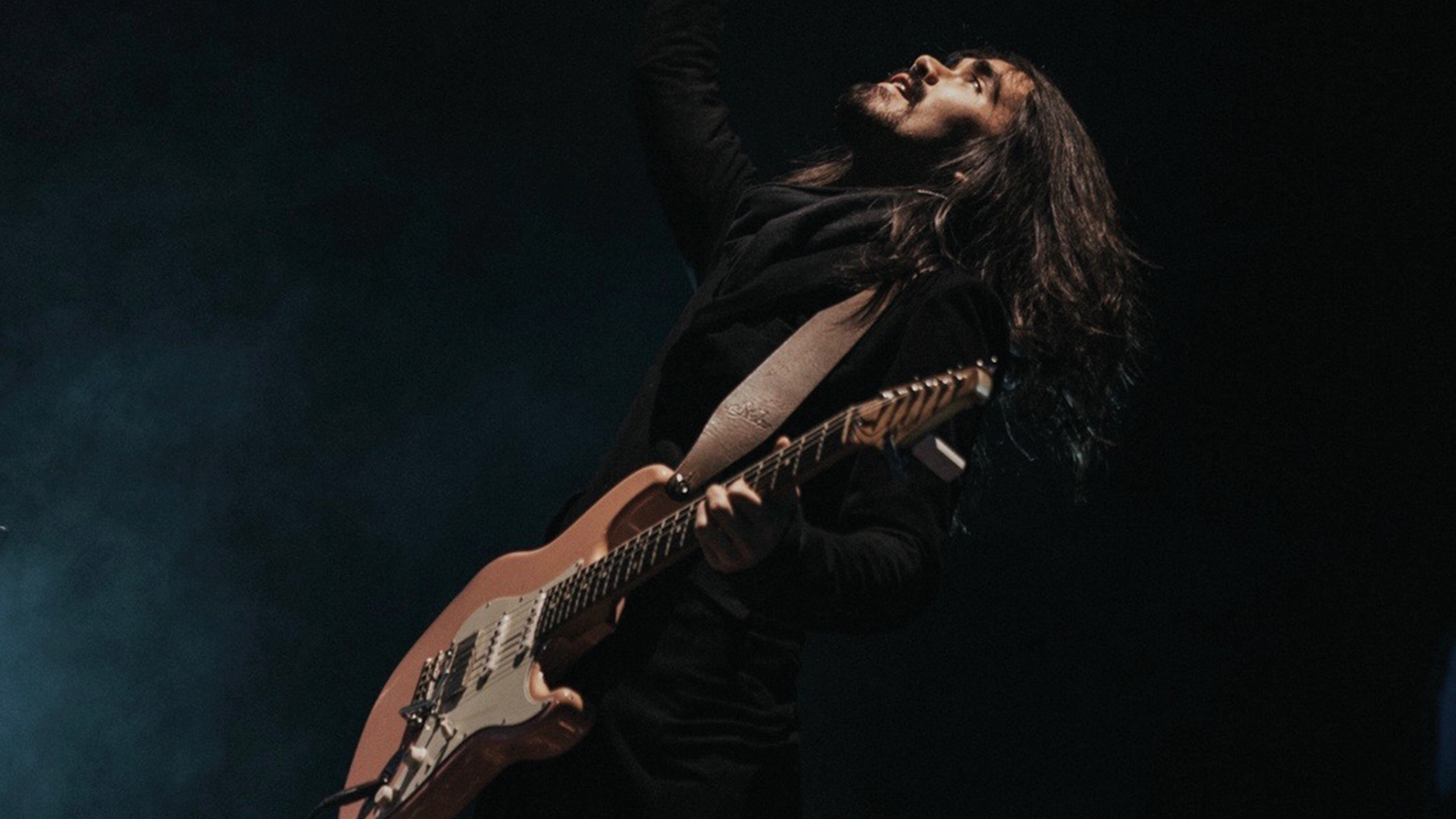
Do we see a similar thing in rock? Are we too stuck in the past? Do guitarists – including young guitarists – put too much emphasis on music that came out 40 or 50 years ago?
JOHN 5: “I couldn’t agree with you more. I couldn’t have put it better. You get stuck at one point and then can’t go any further. But the thing is you can go further. There’s so much more you can do on this instrument. But it’s up to the individual if they want to sit down and learn something. That’s why I never stop trying to improve myself with different techniques or this, that and the other thing. I don’t want to be the same guitar player that I was five, 10 years ago.“
JONES: “I don’t know. The balance between what is new, what is me and what is aping… it’s always kind of been the same, I think. I just think it’s about the chemical reaction people get from hearing it, seeing it and feeling it. And that’s where it’s at. So I don’t ever go, 'Oh, that’s been done.' It’s just kind of like, 'Oh, I can hear the influence and that’s pretty cool.'
“But sometimes it can get under your skin a little bit. You know, five years ago I talked to some kids at a festival and they were telling me how much they liked this band that was playing. And I was like, 'Well you know, you can really tell they love Led Zeppelin…' And the kids were like, 'Who’s Led Zeppelin?'” [Laughs]
That’s why I never stop trying to improve myself with different techniques or this, that and the other thing. I don’t want to be the same guitar player that I was five, 10 years ago
John 5
Will there ever be another Eddie Van Halen – a player who is universally lauded, even among non-musicians, as a traditional “guitar hero”?
ST. VINCENT: “I’m not sure. Eddie Van Halen was an incredible guitar player, but in a very specific milieu. That kind of hero I don’t think could exist again because times like that won’t exist again.
“That was sort of like coming from the different permutations of the blues and going through this filter of the '80s and being, like, brightly colored peacock blues. And we don’t have that lineage right now. Plus, if you just look at the culture, we have deconstructed the idea of a quote-unquote rock star. It’s a very even playing field in terms of people’s eyeballs.
“Some kids on TikTok are as looked at as pop stars. Also, I don’t know that virtuosity is really what we are valuing as a culture globally right now. I think it’s kind of the opposite. And I don’t say that with any big judgment on it. It’s just, you can study your whole life to crush a solo or you can go do a dance on TikTok. [Laughs] So it’s a weird time.“
JONES: “I mean, Eddie Van Halen, he [was] an alien that landed on our planet and showed us how to do it. I don’t really know anyone to compare that to. When I heard him for the first time it was haunting. Can we have another guy come in and really make a mark like Eddie Van Halen? I don’t know. I hope so. I look forward to what’s new in music and what’s weird in music.“
HAMMETT: “I think the guitar hero is a dying breed. The new generation, there’s so many good players that it’s hard to pick out a hero because they’re all kind of guitar heroes in their own right. But a lot of times it’s just great musical gymnastics.
“All guitar heroes are judged by one thing and one thing only – the song they’re playing. You can be the most ripping guitar player, but if your songs fucking suck or are boring or just flat, people are going to be impressed for about 15 minutes. And then they’re going to check their Instagram, see what other guitar players put up.“
ASATO: “Music is just different now. I could not imagine, like, 'Oh, let’s have Kingfish open the Olympics in 2024!' And I love Kingfish. But you don’t see that because the business has changed. The idea of a superstar has a different meaning now.
”It’s not something geared toward the instrument, like it was with Eddie Van Halen or Slash. The last thing that was so helpful was Guitar Hero. There’s so many late-'90s kids who I’m sure got into guitar because of that video game.”
You can be the most ripping guitar player, but if your songs fucking suck or are boring or just flat, people are going to be impressed for about 15 minutes
Kirk Hammett
JOHN 5: ”A hundred percent there will be another guitar hero. It’s up to us, to the people reading this and the people listening to the music to go, 'I can be the next guitar hero.'
”And that doesn’t mean just being able to play the guitar well. It’s someone that can write songs, it’s someone that is inventive. It’s someone that is progressive. There’s a lot that goes into it. But absolutely I think there will be more guitar heroes in the future.”
Has digital recording made you rethink anything about your approach to playing, recording and composing?
ST. VINCENT: “Totally. I know what I sound like. But it’s two sided, right? Like, there’s an aspect of the way you think you sound and then when you hear it recorded back you go, 'Oh, I was dragging there,' or, 'I didn’t bend the right note there.' I could do that better.” And better doesn’t mean perfect. Better just means expressing the particular emotion, thought and feeling in a more effective way.
Better doesn’t mean perfect. Better just means expressing the particular emotion, thought and feeling in a more effective way
St. Vincent
“But the trick is you also have to be able to get lost in the moment so that you’re able to reach for things. You have to learn how to critique yourself to get better, but also not be so dependent on that loop of listening that you don’t let yourself just be free and explore.“
HAMMETT: “What it has done for me is it’s made me more organized. I usually have an overabundance of ideas that I’m looking at and going, 'Where do I start?' Sometimes I just can’t start, because I’m overwhelmed with all the choices. And so going into something like GarageBand or Pro Tools or Logic, it helps me organize things.
“I can put one type of riff in this category, another type of riff in that category, and then put something from one category together with something from another category in Logic and play it in real time and see if it really works – without me actually doing it on my instrument.
“Plus, when I play two pieces of music together on my instrument it feels one way. But when I listen to two pieces of music on the computer, I get a different perspective that’s less subjective. And I need that.“
JOHN 5: “Digital recording is phenomenal. It’s magic. I would never want to go back to the way it was before. Because I can go into the studio in L.A. and send tracks to someone in New York within minutes and it will sound great. The vibe might not be entirely there, but we can get it down.
“But one thing that is a 'good' and a 'bad' is that we have the technology to quantize really well or to pitch-correct or to chop something up. So I think it’s made us a little bit more, like, 'Eh, we’ll fix it later, chop that up, throw this in over here…' I never want to get like that. So what I do with my instrumental records is I will train almost like a fighter, just train, train, train and work on something so hard before I go into the studio, because I want to do it as one performance.“
JONES: “Technology is amazing, but I also think people maybe rely on it too much. When bands ask me about recording a successful song I always say, 'Okay, well, do you want to have it drive in a way that is mechanical or do you want to have it drive in a way that sounds like when you’re playing live?' Because both ways are good. But I prefer the live way.
“I think there’s more passion in hearing the flaws and the slowing down and speeding up. When a part gets quieter, maybe it gets a little more out of time, and then when it gets loud it speeds up a little bit and gets your heart racing. But both are good. You look at Metallica and you look at Ministry – two different things. Two different emotional reactions.“

Are there any young or up-and-coming players out there that you see as the next generation of guitar hero?
HAMMETT: “I do really like Annie [St. Vincent]. I love her riffs. The way she writes, some of her musical motifs are just so different from anything I would ever play. I find that so intriguing. And I love the fact that she understands totally what she’s doing and she understands the theory behind it. For me, that always adds another dimension of respectability – knowing that the person’s not just fucking winging it and all of a sudden stepping in something.“
ST. VINCENT: “I’m really excited by what’s happening in the current British post-punk scene, with bands like IDLES. And also Black Midi – they have some really cool guitar, but it’s not necessarily pyrotechnic guitar-hero stuff in an Eddie Van Halen sort of way.“
JOHN 5: “Oh, I love everybody. I love Guthrie [Govan]. Rick Graham is wonderful. Jason Richardson. And Mateus – he has such great technique and phrasing and chords. There’s so many people that I just really enjoy. I have so much fun with it.“
ASATO: “Now with the access of learning the instrument so easily and virtually, you see prodigies earlier and earlier. It’s insane. I’ve seen kids 6 years old, 7 years old, playing, like, with so much maturity. There’s a kid named Taj Farrant, who’s 11, I think, and he’s so cool playing the guitar.
“I always mention Melanie Faye, and there’s another young guy from Indonesia, his name is Achmad Satria. He plays a pink guitar like me, and some people think we even look alike. [Laughs] But he is way younger than me and he is playing with some balls. He’s extremely talented.“
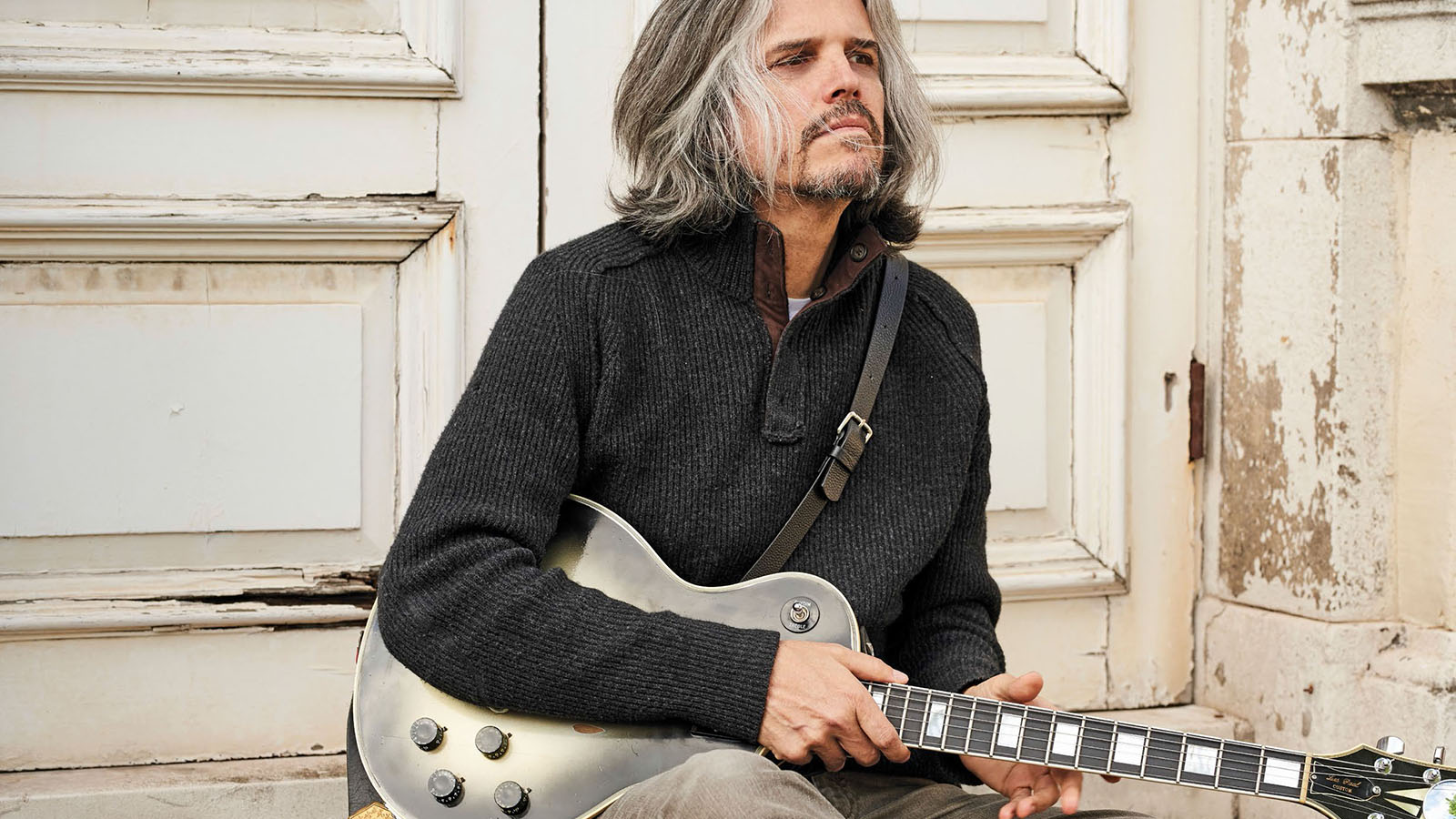
INGRAM: “There’s so many. I have a partner in Chicago – Jamiah Rogers. And you’ve got Marquise Knox out of St. Louis. Another one is Jontavious Willis out of Georgia. There’s a lot of players out there on the rise and making their voices heard with the guitar.“
JONES: “I’m terrible with names, but there’s a guy on Instagram, Nathaniel Murphy, he teaches guitar and so he’ll play his own lick, which is amazing, and then he’ll play, you know, the Welcome to the Jungle solo and nail it. And you can tell he really enjoys it. I can get off on that.
“And then there’s another guy, Sarthak Mudgal, who does this insane percussive thing. But what’s great now is anyone can start a channel or start an Instagram and put their music out there and people will be exposed to it. Maybe it’s more competition, but it’s a wonderful thing.“
I would like to be able to hit a note and have it sustain forever. So I could be my own Glenn Branca orchestra. That would be cool
St. Vincent
Finally, if there were a guitar genie and he could grant you a magic knob on your guitar that could do one thing and one thing only, what would it be?
ST. VINCENT: “So my brain is going a couple different ways with this. There’s one way that’s thinking, 'Cure cancer.' And then there’s another way that’s like… 'A kill switch?'
I think it should have something to do with your sound. You can’t change the world with it.
ST. VINCENT: “I would like to be able to hit a note and have it sustain forever. So I could be my own Glenn Branca orchestra. That would be cool.“
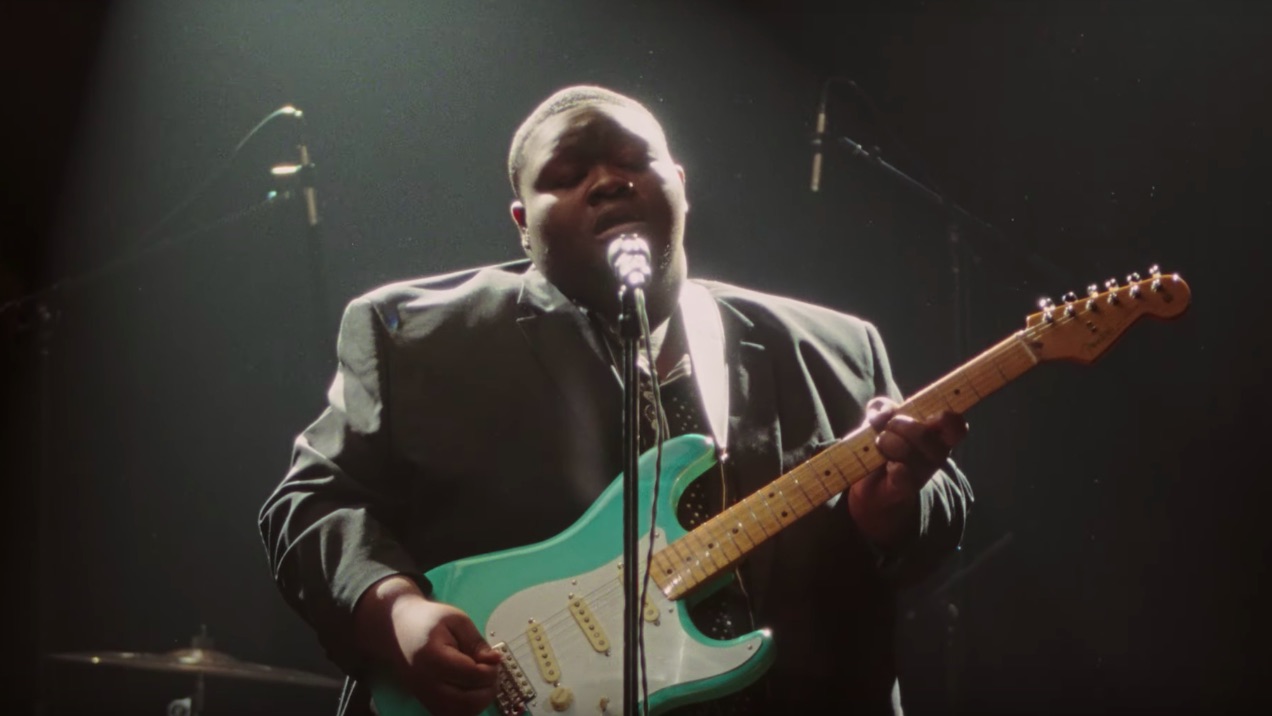
How about the rest of you?
INGRAM: “Man… I would have something that could make you stay in tune. [Laughs] Something that prevents you from playing sloppy or prevents you from being repetitive. It’d be like a talent enhancer.“
HAMMETT: “I would say something that would give me, like, a nice, singing, sustained tone that when people hear it, it draws them closer. Like a violin or a cello or a harp sound. Something just so pure and beautiful, and acoustic and earthy. I’ll tell you, for about half of my musical career I’ve been on a quest to find Billie Holiday’s vocal tone on guitar.
“And you know, Greeny [Hammett’s 1959 Les Paul that was previously owned and played by Peter Green and Gary Moore] in the middle position is similar. But it’s not quite there.“
For about half of my musical career I’ve been on a quest to find Billie Holiday’s vocal tone on guitar
Kirk Hammett
ASATO: “I would have an auto-tune type of button that would fix any bad notes. Of course, traditional players would hate me for that! Or, you could also use it the way rap guys do. It’d be like Kanye West in a guitar sound. That would probably sound horrible, but at the same time it could be interesting as a flavor.“
JONES: “Maybe a knob to make the writing process more successful, and quicker. Although I do like the process of writing. It’s just that anything you’re doing that’s artistic, it just rips you up and it’s really hard. But when it’s done you’re like, 'Oh, let’s do another one!'“
JOHN 5: “I’d like a button that would give me my own little monitor mix onstage. Like if I want to turn myself up or even turn myself down. Because it’s crippling sometimes if you’re not loud enough or you’re too loud onstage. So I would want something on my guitar where I could just turn it and everything would be okay. Save the show!
JONES: “It’s kind of like having a wish – I would wish for more wishes. So if I had a knob, I’d probably want more knobs. A knob that would have more knobs! [Laughs]“
Rich is the co-author of the best-selling Nöthin' But a Good Time: The Uncensored History of the '80s Hard Rock Explosion. He is also a recording and performing musician, and a former editor of Guitar World magazine and executive editor of Guitar Aficionado magazine. He has authored several additional books, among them Kurt Cobain: Montage of Heck, the companion to the documentary of the same name.


![A black-and-white action shot of Sergeant Thunderhoof perform live: [from left] Mark Sayer, Dan Flitcroft, Jim Camp and Josh Gallop](https://cdn.mos.cms.futurecdn.net/am3UhJbsxAE239XRRZ8zC8.jpg)







